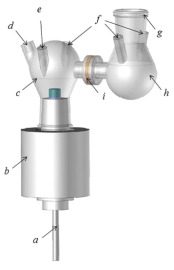
Inverted RDE (iRDE) as Novel Test Bed for Studies on Additive-Assisted Metal Deposition under Gas-Evolution Conditions
The paper authored by
P. Moreno-García, V. Grozovski, M. de J. Gálvez Vázquez, N. Mysuru, K. Kiran,
N. Kovács, Y. Hou,
S. Vesztergom and P. Broekmann
is published in Journal of The Electrochemical Society (2020, vol. 167, p. 042503).
Abstract:
The development of Co interconnects by electrochemical means is more challenging than that of Cu interconnects not only due to the ever decreasing critical feature dimensions but also to intrinsic complications of the water/Co system, as Co electrodeposition processes are inevitably plagued by the competing hydrogen evolution reaction (HER). We present herein a novel custom-made inverted RDE instrument, particularly suitable for studying additive-assisted metal deposition processes that are accompanied by HER or any other gas evolving side reactions. We investigate the influence of a model redox-active suppressor additive on the electrochemical deposition of cobalt by means of linear sweep voltammetry and galvanostatic electrolysis coupled to online gas chromatography analysis. We find that under specific experimental conditions, addition of minor amounts of the additive to the standard Co-based virgin make-up solution significantly decreases the rate and efficiency of Co deposition, and favours instead the competing HER. Moreover, we identify and quantify the reductive conversion of the additive that accompanies the primary metal deposition process. Importantly, our approach complements standard screening Co plating studies as it succeeds to directly deconvolve the overall process into its three individual components, namely the metal ion reduction, the HER and the additive activation process.
